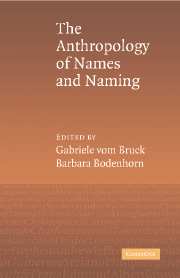Book contents
- Frontmatter
- Contents
- Contributors
- Preface and Acknowledgments
- 1 “Entangled in Histories”: An Introduction to the Anthropology of Names and Naming
- 2 “Your Child Deserves a Name”: Possessive Individualism and the Politics of Memory in Pregnancy Loss
- 3 Why the Dead Do Not Bear Names: The Orokaiva Name System
- 4 The Substance of Northwest Amazonian Names
- 5 Teknonymy and the Evocation of the “Social” Among the Zafimaniry of Madagascar
- 6 What's in a Name? Name Bestowal and the Identity of Spirits in Mayotte and Northwest Madagascar
- 7 Calling into Being: Naming and Speaking Names on Alaska's North Slope
- 8 On Being Named and Not Named: Authority, Persons, and Their Names in Mongolia
- 9 Injurious Names: Naming, Disavowal, and Recuperation in Contexts of Slavery and Emancipation
- 10 Where Names Fall Short: Names as Performances in Contemporary Urban South Africa
- 11 Names as Bodily Signs
- Bibliography
- Index
9 - Injurious Names: Naming, Disavowal, and Recuperation in Contexts of Slavery and Emancipation
Published online by Cambridge University Press: 17 August 2009
- Frontmatter
- Contents
- Contributors
- Preface and Acknowledgments
- 1 “Entangled in Histories”: An Introduction to the Anthropology of Names and Naming
- 2 “Your Child Deserves a Name”: Possessive Individualism and the Politics of Memory in Pregnancy Loss
- 3 Why the Dead Do Not Bear Names: The Orokaiva Name System
- 4 The Substance of Northwest Amazonian Names
- 5 Teknonymy and the Evocation of the “Social” Among the Zafimaniry of Madagascar
- 6 What's in a Name? Name Bestowal and the Identity of Spirits in Mayotte and Northwest Madagascar
- 7 Calling into Being: Naming and Speaking Names on Alaska's North Slope
- 8 On Being Named and Not Named: Authority, Persons, and Their Names in Mongolia
- 9 Injurious Names: Naming, Disavowal, and Recuperation in Contexts of Slavery and Emancipation
- 10 Where Names Fall Short: Names as Performances in Contemporary Urban South Africa
- 11 Names as Bodily Signs
- Bibliography
- Index
Summary
“Slaves and dogs are named by their masters. Free men name themselves.”
(Moore 1960)PROLOGUE: NAMES OF THE FATHER
In April 1999, in the course of a conference on “Race in 21st Century America” held at Michigan State University, I attended an acrimonious public debate staged between Dinesh D'Souza, the author of The End of Race? and the African American political scientist Manning Marable. Marable argued for the uniquely oppressive character of African American experience in the United States, past and present; D'Souza, predictably enough, was there to reiterate his argument that too much fuss is made about racial inequality in America and African Americans should just get on with helping themselves. It was a bad-tempered affair, and in the end Marable sought to clinch the argument by reaching, not for the carefully marshaled evidence with which he had opened the debate, but for personal testimony. He chose, in fact, to speak about naming, and about his name in particular. He was, he told the audience, called Marable because his great-grandfather, a slave, had been sold as a small boy of nine to a man called Marable, sold by the master who was also his father, with his mother weeping by his side. The point of the story was clear: that the injuries of the African American past were so grievous that there could be no comparison with even the harshest of immigrant experiences.
- Type
- Chapter
- Information
- An Anthropology of Names and Naming , pp. 177 - 199Publisher: Cambridge University PressPrint publication year: 2006
- 2
- Cited by



